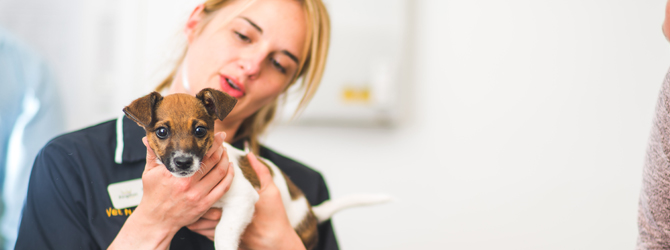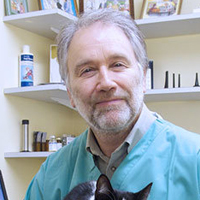Dog skin cancer: types, symptoms and treatment
3 min read
The idea of discovering that your dog has skin cancer is upsetting, but the diagnosis may not be as bad as you think. Read on to find out why…
Skin cancer is the most commonly diagnosed type of cancer in dogs – partly because skin growths are easy to spot. The good news is, catching skin cancer early increases the chances of your canine friend making a full recovery.
Skin tumours are more common in older dogs, in breeds such as Boxers, Retrievers, and Cocker Spaniels, and in light-coloured dogs, whose skin is often more sensitive to the sun. But discovering a growth or tumour on your dog’s skin doesn’t necessarily mean cancer. There are lots of other possible causes for lumps and bumps on dogs, including abscesses, cysts, warts, and skin tags.
Common types of skin tumour in dogs
Growths and tumours can be malignant (cancerous), which means they’re likely to spread or get worse, or benign, which means harmless, or non-cancerous.
Types of skin cancer in dogs
The most common types of skin cancer in dogs include:
- Malignant melanoma
- Mast cell tumours
- Squamous cell carcinoma
- Histiocytic cell tumours
- Fibrosarcoma
Melanoma in dogs
Melanomas can be malignant or benign. Benign melanomas are more common. Malignant melanomas can grow quickly and spread to other organs, so it’s vital to get treatment fast. Malignant melanomas look like raised lumps, usually black in colour, and are often found on the mouth, lips and nail beds.
Mast cell tumours in dogs
Mast cell tumours are the most common type of skin cancer, and often affect dogs between eight and ten years old. They can grow anywhere on your dog’s skin or internal organs, and are most commonly found on the chest, limbs, and lower abdomen. They have a raised dome like appearance and are often slightly redder than the surrounding skin.
Squamous cell carcinoma in dogs
Squamous cell carcinoma mostly affects older dogs, and are usually found on the stomach. They appear as firm raised patches or lumps.
Histiocytic cell tumours in dogs
Histiocytic cell tumours are most common in dogs aged under three. They’re especially common in Scottish and Boston Terriers, Boxers, Greyhounds, and Bulldogs.
Fibrosarcoma in dogs
Fibrosarcoma skin tumours are often found on the limbs of middle-aged or older dogs. Usually slow growing, fibrosarcoma rarely spreads, but can bleed, ulcerate, or become infected.
Signs and symptoms of skin cancer in dogs
Only your vet can confirm whether a lump, bump, sore or lesion on your dog’s skin is skin cancer, so get your dog to your local vet clinic for a thorough check up if you spot any of the following:
wart-like growths on the skin, between 2mm and 1cm across
yellow, brown or black in colour – particularly on the face, eyelids or head
- Loss of hair around the growth
- Itchiness and irritation
- Redness
- Sores that won’t heal
- Inflammation and swelling
- Bleeding or ulceration
How will my vet diagnose skin cancer?
Your vet may suggest blood tests, blood samples and X-rays to help them make an accurate diagnosis.
If your vet suspects the lump on your dog is skin cancer, he or she will recommend taking a biopsy to establish whether the growth or tumour is cancerous or non-cancerous, and to decide on the best treatment.
They may also recommend an MRI or ultrasound scan to see how far the disease has spread, and to determine your dog’s general health (healthy dogs respond better to treatment).
The science bit… a biopsy is a small sample of tissue removed from the body for examination under a microscope. The results of the biopsy can help to determine whether a lump (sometimes called a tumour, growth or mass) is cancerous.
Treating skin cancer in dogs
Caught early enough, skin cancer in dogs may be treatable. Treatment will depend on the type of skin cancer, how far the cancer has spread, and the general health of your dog. Treatment types may include:
- Surgery
- Chemotherapy
- Radiation
- Immunotherapy
Want advice on skin cancer in dogs?
For expert help and advice on skin cancer in dogs, get in touch with your local vet.
Find your nearest vet using our Find a Vet page, or speak to a vet online using Online Vets.

